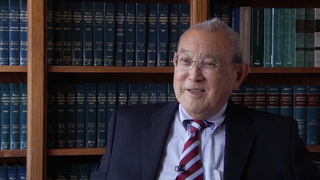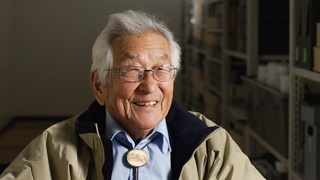Interviews
Didn't have rights that whites had
We didn’t have all the rights that caucasians had, and it was because of racism. And, of course, when December 7th happened, it was also hysteria, and Americans also looked at December 7th from a very economic point of view. I mean, Japan had been working the land. I mean, she was given only the worst kind of desert land and she made it fertile. And so, other farmers—caucasians—it would be to their advantage if the Japanese were thrown out, and they could work the land. Uh so, I think on what are the civil rights we lost: I think, well, we never had all the civil rights. Uh, and I think, that’s how come, too, that there came to be a group called the “No No Boys.” Because, they felt it was more important to fight for civil rights, than to fight the enemy. I think a lot of Japanese felt they weren’t treated like a real American.
Date: June 16, 2003
Location: California, US
Interviewer: Karen Ishizuka, Akira Boch
Contributed by: Watase Media Arts Center, Japanese American National Museum.
Explore More Videos

Being Denied as a Japanese American Lawyer
(b. 1934) The First Japanese American Appointed to the U.S. Court of Appeals.


Feeling prejudice while looking for jobs
(1919 - 2015) Nisei who served in World War II with the 442nd Regimental Combat Team

Generosity of the Italians
(1919 - 2015) Nisei who served in World War II with the 442nd Regimental Combat Team

Invited to teach at Harvard by his boss
(1919 - 2015) Nisei who served in World War II with the 442nd Regimental Combat Team

Returning to Japan after studying in New York
(1940-2016) Issei Landscape Architect

Discrimination faced in San Francisco (Japanese)
(b. 1937) A war bride from Yokohama

The riot in Manzanar
(b. 1921) Nisei veteran who served in the occupation of Japan

The Dopey bank that survived the war
(b. 1934) Award-winning Disney animation artist who was incarcerated at Topaz during WWII

Accepted by Japanese society as I learned more Japanese (Japanese)
(b. 1979) Sansei Nikkei Brazilian who lives in Oizumi-machi in Gunma prefecture. He runs his own design studio.

Evacuated to the Jungle
(b. 1938) Philipines-born hikiagesha who later migrated to the United States.

Captured by Guerillas after bombing of Pearl Harbor
(b. 1938) Philipines-born hikiagesha who later migrated to the United States.

Grandfather picked up by US Army
(b. 1952) Former banking executive, born in Hawaii

Father's business partner operated their farming business during WWII
(b. 1935) Sansei businessman.

Father was convinced the constitution would protect him
(b. 1935) Sansei businessman.
